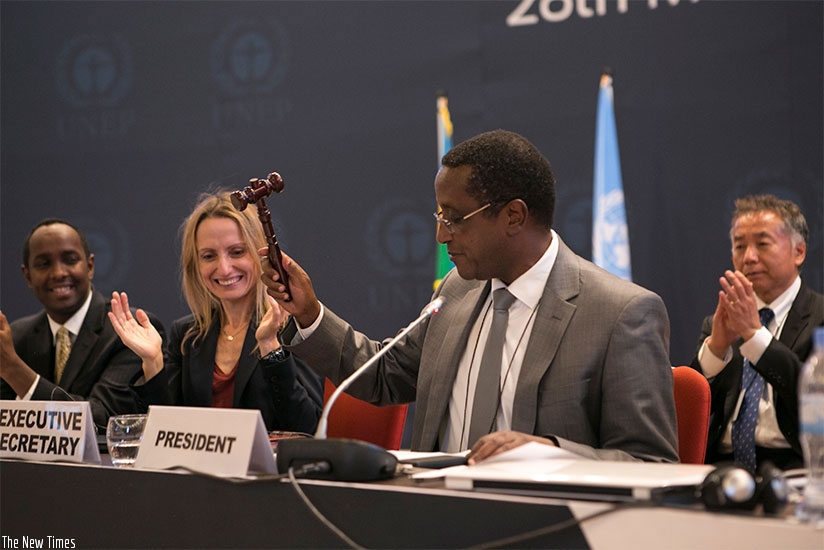The European Union (EU) has been hailed for signaling its determination to lead global efforts to tackle climate change when its top body, the EU Council, adopted a decision to fully back the Kigali Amendment to the Montreal Protocol that will ensure protection of climate from powerful greenhouse gases.


The European Union (EU) has been hailed for signaling its determination to lead global efforts to tackle climate change when its top body, the EU Council, adopted a decision to fully back the Kigali Amendment to the Montreal Protocol that will ensure protection of climate from powerful greenhouse gases.
The purpose of the Kigali Amendment, which was agreed on October 15, 2016, is to achieve a global reduction in the consumption and production of hydrofluorocarbons (HFCs), one type of the gases that contribute to the warming of earth’s atmosphere.
Responding to the development, the Minister for Natural Resources, Dr Vincent Biruta, commended the Council "for prioritising Climate Action and giving EU members the green light to ratify the Kigali Amendment.”
The minister said 20 ratifications are needed for the Kigali Amendment to come into force by the set deadline of January 1, 2019.
"So far, we have four ratifications, including Rwanda, and, for the EU to make such a decision it means we are likely to get the requisite number of ratifications since there are more than 20 countries in the EU,” he told The New Times.
The Montreal Protocol on Substances that Deplete the Ozone Layer is an international treaty designed to protect the ozone layer – a region of the earth’s atmosphere that absorbs the sun’s harmful ultraviolet radiation – by phasing out the production of numerous substances that are responsible for ozone depletion.
The Global Green Growth Institute (GGGI) Country Representative, Innocent Kabenga, told The New Times that the EU move is "very important.”
"The EU is composed of 27 countries and such a decision applies to all members. This is a huge step forward as far as in the Paris Agreement and the protection of our environment are concerned,” he said.
Next steps
The Council decision, it is noted, enters into force immediately after adoption. The EU has to formally deposit the declaration of competence together with the instrument of ratification of the Kigali Amendment at the United Nations.
Member states are currently following their respective ratification processes considering that they also need to obtain approval from their national parliaments.
The Amendment will enter into force on January 1, 2019 upon ratification by at least 20 states or regional economic integration organisations that are parties to the Montreal Protocol.
If this threshold is not reached by then, the Amendment will enter into force on the 90th day following the date on which this condition has been finally fulfilled.
Although greenhouse gases do not damage the ozone layer, their release into the atmosphere contributes to climate change and they have a significant impact on global warming, the phenomenon of increasing average air temperatures near the surface of Earth over the past two centuries, experts say.
The implementation of the Kigali Amendment is expected to prevent warming of up to 0.5° Celsius by the end of the century, thus making a positive contribution to reaching the targets of the 2016 Paris climate agreement.
"HFCs are thousands of times more harmful to the climate than carbon dioxide. I welcome the decision,” Siim Kiisler, the Minister of the Environment of Estonia, is quoted as saying.
The HFCs can be found in equipment and products used in daily life such as fridges, air conditioners, foams and aerosol sprays. Implementation at EU level
The EU member states, like other developed countries, are required to start the first reductions in 2019.
However, the EU has taken early action and is at the forefront of compliance. A regulation adopted in 2014 on fluorinated greenhouse gases enabled the EU to already begin phasing down HFCs in 2015.
This regulation will have to be reviewed to comply with the Kigali Amendment beyond 2030.
The Montreal Protocol has been amended a fifth time to reduce HFCs. This Amendment was adopted at the 28th Meeting of the Parties in October 2016 held in Kigali. Under its provisions, developed countries will be the first to start the phase-down process in 2019.
For most developing countries, the first step to reduce the production and consumption of these greenhouse gases begins in 2029, while for the remaining developing parties the first step is set for 2032.
editorial@newtimes.co.rw


